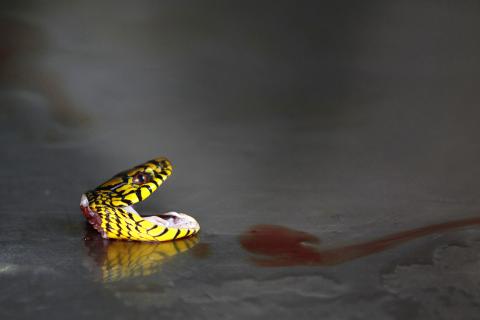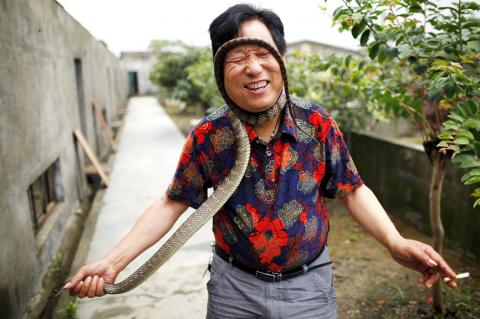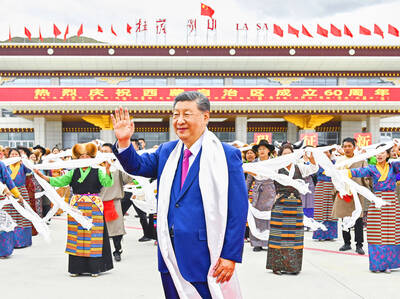This sleepy village nestled in the heart of vast farmland in China’s eastern Zhejiang Province hides a deadly secret.
A step into the homes of any of the farming families here brings visitors eye-to-eye with thousands of some of the world’s most feared creatures — snakes, many of them poisonous.
Cobras, vipers and pythons are everywhere in Zisiqiao, aptly known as the snake village, where the reptiles are deliberately raised for use as food and in traditional medicine, bringing in millions of US dollars to a village that otherwise would rely solely on farming.

Photo: Reuters
“As the No. 1 snake village in China, it’s impossible for us to raise only one kind of snake,” said Yang Hongchang, the 60-year-old farmer who introduced snake breeding to the village decades ago. “We are researching many kinds of snakes and the methods of breeding them.”
In 1985, Yang started selling snakes he caught around the area to animal vendors. He soon began to worry that the wild snakes would run out and thus began researching on how to breed snakes at home.
Within three years, he had made a fortune — and many other villagers decided to emulate his success.

Photo: Reuters
Today, more than 3 million snakes are bred in the village every year by the 160 farming families.
Snakes are renowned for their medicinal properties in traditional Chinese medicine and are commonly drunk as soup or wine to boost the person’s immunity.
Yang has now started his own company to make his business more formal and build a brand, and also to conduct research and development for his products, which range from dried snake to snake wine and snake powder.
“Our original breeding method has been approved and recognized by the province and the county. They see us as the corporation working with the farming families,” Yang said. “So the company researches on the snakes and they hand them over to the farms for breeding. They said this model was working very well.”
The original breeding method was simply putting males and females together, but now meticulous research is done on how the snakes breed, how to select good females, investigation into their diet and how to incubate eggs so survival rates rise.
With rising demand for snake products from restaurants and medicine halls due both to rising wealth and a government push for breeding the animals to be used in traditional medicine, Zisiqiao villagers are now boasting a annual income of hundreds of thousands of yuan a year.
Yang Xiubang, 46, has been raising snakes in his home for more than 20 years and said his annual income has been steadily rising.
“The demand for traditional Chinese medicine is quite high in China,” he said. “After we finish producing the dried snake, most of them are sent to medicine factories. This also includes snake livers and snake gallbladders.”
Yang added snake products from the village are currently being exported globally to countries such as the US, Germany and Japan.
Closer to home, snake products from the village are sold Hangzhou, where the Hangzhou Woai Co offers a plethora of goods, including snake powders.
“Each part of the snake is treasured,” store manager Gao Chenchang said.

Ten cheetah cubs held in captivity since birth and destined for international wildlife trade markets have been rescued in Somaliland, a breakaway region of Somalia. They were all in stable condition despite all of them having been undernourished and limping due to being tied in captivity for months, said Laurie Marker, founder of the Cheetah Conservation Fund, which is caring for the cubs. One eight-month-old cub was unable to walk after been tied up for six months, while a five-month-old was “very malnourished [a bag of bones], with sores all over her body and full of botfly maggots which are under the

BRUSHED OFF: An ambassador to Australia previously said that Beijing does not see a reason to apologize for its naval exercises and military maneuvers in international areas China set off alarm bells in New Zealand when it dispatched powerful warships on unprecedented missions in the South Pacific without explanation, military documents showed. Beijing has spent years expanding its reach in the southern Pacific Ocean, courting island nations with new hospitals, freshly paved roads and generous offers of climate aid. However, these diplomatic efforts have increasingly been accompanied by more overt displays of military power. Three Chinese warships sailed the Tasman Sea between Australia and New Zealand in February, the first time such a task group had been sighted in those waters. “We have never seen vessels with this capability

A Japanese city would urge all smartphone users to limit screen time to two hours a day outside work or school under a proposed ordinance that includes no penalties. The limit — which would be recommended for all residents in Toyoake City — would not be binding and there would be no penalties incurred for higher usage, the draft ordinance showed. The proposal aims “to prevent excessive use of devices causing physical and mental health issues... including sleep problems,” Mayor Masafumi Koki said yesterday. The draft urges elementary-school students to avoid smartphones after 9pm, and junior-high students and older are advised not

Chinese President Xi Jinping (習近平) attended a grand ceremony in Lhasa yesterday during a rare visit to Tibet, where he urged “ethnic unity and religious harmony” in a region where China is accused of human rights abuses. The vast high-altitude area on the country’s western edge, established as an autonomous region in 1965 — six years after the 14th Dalai Lama fled into exile — was once a hotbed for protest against Chinese Communist Party rule. Rights groups accuse Beijing’s leaders of suppressing Tibetan culture and imposing massive surveillance, although authorities claim their policies have fostered stability and rapid economic development in